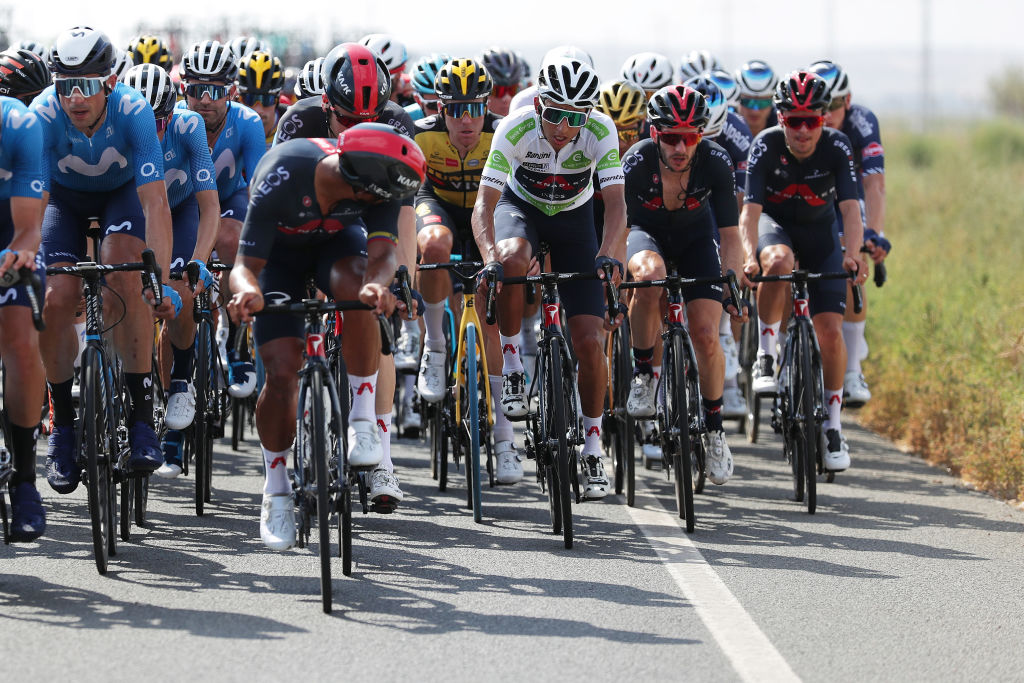Egan Bernal unscathed after narrowly missing major Vuelta a España crash
Carapaz delayed by crash but regains contact in fraught day in Spain

Ineos Grenadiers co-leader and major Vuelta a España favourite Egan Bernal had a narrow miss on Wednesday's stage 5 as the Colombian just avoided getting entangled in the massive crash in the closing kilometres of the race.
On one of the most fraught first-week stages of the Vuelta in years, two-thirds of the peloton either fell or were held up by the crash, with Bernal’s teammate and co-leader Richard Carapaz, not a faller, but caught behind. Finally, though, all of the Ineos Grenadiers leaders, including Adam Yates, were reported to have come through unharmed and not delayed.
Bernal himself said the crash had been very close, but that he was well ahead in the bunch when it happened and so could avoid any issues.
“It all took place right next to me,” the Colombian said, “but I was so concentrated I barely noticed. I heard caida ,caida [crash, crash] on the radio, but by then I was ahead.
“Thanks to team work from the directors cars through to the riders, thanks to them all we saved the day.”
Bernal said the last part of the stage had been “very nervous” as the bunch jostled for position, the pace picked up and the risk of echelons increased. With around 30 kilometres to go, Bernal himself came to the front and then Pavel Sivakov briefly picked up the pace.
However, Bernal added, the wind never increased enough for the echelons to actually materialize.
Get The Leadout Newsletter
The latest race content, interviews, features, reviews and expert buying guides, direct to your inbox!
“There was a lot of headwind, then when we turned, there was a crosswind, which is why we were on the front. But although the wind was strong, it wasn’t enough to break up the peloton.”
Asked, again, if it could have been possible to try to isolate their rivals, Bernal said, “We wanted to do a lot of things, but it was better to stay calm. The important thing was to have all the guys up there right at the end.”
Sivakov himself said that he had misheard instructions from the team car about trying to kick things off with 30 kilometres to go. But he argued that in any case, staying ahead was never a bad idea in such potentially dangerous circumstances.
“I actually thought they were telling me on the radio to go, which is why I accelerated even harder, but in fact it was the opposite,” the Russian said. “It was good to stay in front though because you saw what happened a few kilometres further on with the crash.
“We wanted to be safe, there’s always the possibility of falling on one of those bends.”
He agreed with Bernal that an echelon was never really a possibility.
“You would have needed more of a cross-tailwind and it was a cross-head. In any case the wind wasn’t strong enough. What caused the crash was just all the tension in the bunch. Luckily everybody in our team got through."
Sivakov concurred that getting a stage like the one to Albacete out of the way was above all a relief, particularly for his leaders.
“Richard was involved in the crash, he didn’t crash but he was behind. Then I had to close the gap with him but we didn’t have any problems,” Sivakov concluded. “So I think that was good.”
Alasdair Fotheringham has been reporting on cycling since 1991. He has covered every Tour de France since 1992 bar one, as well as numerous other bike races of all shapes and sizes, ranging from the Olympic Games in 2008 to the now sadly defunct Subida a Urkiola hill climb in Spain. As well as working for Cyclingnews, he has also written for The Independent, The Guardian, ProCycling, The Express and Reuters.
